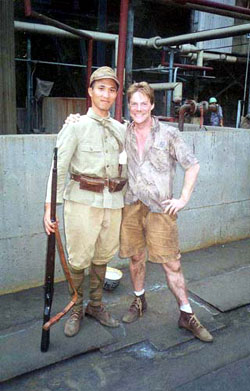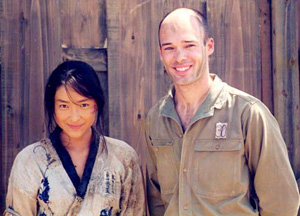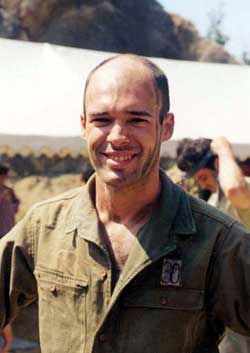|

"Quiet
please.... Action!"
So
there I was, a prisoner of war headed back to camp after
a long, hard day of forced labor. I was hot, tired,
sun-burnt. The guard to my right glared -- ready to
shoot me if given the slightest provocation. I avoided
eye contact. Kept moving. As I walked past the Colonel,
I could tell he was looking for a spy among us…
"Cut-oh!"
That’s
Japanese for "CUT!" The director still wasn’t
happy. It was at least the 17th time we’d done
that scene. We went back to our positions. The make-up
ladies applied more "dirt" make-up to our
faces and "sweat" (water out of a spray bottle)
on our backs. Both mixed in with the real thing.
I
was an extra: One of 100 foreigners selected to play
prisoners of war for Imamura Shohei’s newest film,
Kanzoh Sensei (Dr. Akagi in English). Winning the Palme
d’ Or for Unagi or "Eel" has made him
one of the world’s most prestigious filmmakers,
so it’s quite an honor to work with him —
even in a role as minor as mine.
He
had certainly worked his magic on Okayama. Stepping
off the bus and onto the set was like a time warp to
August 1945. Of course there were cameras, film crews
and my fellow foreign extras to remind me that this
was fantasy, not fact. Besides, most of us looked more
like rejects from Chuck Norris’ Missing In Action
than real POWs. With lots of long hair, goatees (all
the rage among soldiers in the Pacific), and tattoos
in full view, I could see most of us were going to wind
up on the editing room floor.
 THE
PLOT THE
PLOT
Like
most soldiers, we were working on a strictly "need
to know" basis in terms of storyline. That made
it very hard for a "serious" method actor
like myself to find my "motivation." (I’ll
have you know that back in high school, the Naked Man
was quite the THESBIAN with leading roles in Once Upon
A Mattress, Damn Yankees and Where’s Harvey). Anyway,
I only know the story as told to me by another extra
at the shoot:
It’s
about a 60-year-old doctor living in a small coastal
town in Japan. He’s known as the "Liver Doctor"
because his diagnosis is always the same: "It’s
your liver," he tells his patients. Also in this
village is a girl who "likes sex" and gets
paid for it. She’s about 20. The doctor likes her
and doesn’t want to see her selling her body (whether
she enjoys it or not!) So he gives her a job as a nurse…
and then has sex with her.
"That’s
it?" I was promised the film would be more profound,
but that’s all the info I could get at the time.
I had no idea how World War II or myself would be factored
in. I am just a lowly extra. As the day passed, more
information would come to light: Japan’s POWs were
sent -- against Geneva Convention regulations -- to
work in factories, melting down metal for the war effort.
The US unknowingly bombed many of these same buildings
on their routine raids. The factory that Shohei chose
for the film was a huge, gray, Orwellian structure.
They allowed us to use the location only on the condition
that we use hardhats off camera and that it remain nameless.
It seems POWS did actually work and die there during
the war. The fact that the Japanese government used
POWs in this manner is a lesser known war secret that
Shohei wanted expose.
 Speaking
of exposure, I also heard that the final scene involves
our two main characters making love in a small boat
at sea, on a hot August morning. Just as they are reaching
their climax, a huge black mushroom cloud magically
appears on the horizon: Hiroshima. Speaking
of exposure, I also heard that the final scene involves
our two main characters making love in a small boat
at sea, on a hot August morning. Just as they are reaching
their climax, a huge black mushroom cloud magically
appears on the horizon: Hiroshima.
50 YEARS AGO…
During
WWII my grandfather was brought over to fight the Japanese.
The fact that I came here to teach them has always been
hard for him to grasp. While his mission may have been
to kill, I don’t think he had any opportunities
(at least none he told me about). He apparently served
the whole time as an MP (Military Police) on a base
in the Philippines. He likes to tell the story of how
he was patrolling one day and out of the corner of his
eye he saw a case of Budweiser somehow floating across
a tall, grassy rice field. It was traveling parallel
to him so when he reached the next intersection, he
turned right to cut the beer off at the pass. Eventually
it arrived at the road and from under it appeared a
very surprised and scared Filipino boy. He was about
to run when my grandfather told him to stop and with
a stern look on his face patted the seat beside him.
The boy got in the jeep, not knowing what would happen.
My grandfather asked him where he lived. The boy pointed
the way. Once they got to the boy’s house built
on stilts, the boy jumped out of the jeep and started
running for his home. My grandfather yelled to him:
"Hey! You forgot your beer!" The boy’s
mother came out to see what was going on and ended up
inviting my grandfather into their house for dinner.
I don’t think he’ll ever forget sitting on
the floor, eating their food and enjoying Budweiser
with his newfound friends in the midst of World War
II.
I
got off on a little tangent. I was reminded of my grandfather
by an old Japanese man there with us. He looked like
a typical rice farmer, with this dirty white shirt,
dark, knee-high pants, and conical hat, only there were
no rice fields around. And this "farmer" sure
knew how to wield a bayonet. At first I thought he was
just some local come to watch us film — and may
have been -- but then he started to make himself useful
by demonstrating to a group of Japanese college guys
(also extras playing Japanese soldiers), how to mount
their bayonets on their rifles and thrust them into
their enemies! Had he been a real Japanese soldier during
WWII? Perhaps even a prison guard? I wonder if, like
my grandfather, he too felt it difficult to comprehend
how so many of us could be here teaching and not fighting.
50 years isn’t that long.
 SEND
IN THE MARINES! SEND
IN THE MARINES!
As
I said, there were some real US soldiers in our midst.
They were lead by a guy with a gravity defying blonde
buzz-cut. His men called him "Sergeant Joe."
He was a seasoned veteran when it came to G.I. life
in Japan. He had mastered the ability, not necessarily
to speak Japanese, but to speak a slow, Tonto/Tarzan
English that local girls tend to understand. He was
a non-commissioned officer with an opportunity to assert
his leadership, get a speaking part in the film -- and
maybe even a date with the girl in charge of casting!
He was working hard for all three. I have to say, he
did have some star power potential with his eagle eyes
and erect hairdo.
As
soon as we arrived, he began barking orders to us over
a bull horn that he’d commandeered from the wimp
who was our designated leader. We were told to line
up, break into smaller squads and get our prisoners’
uniforms (extremely tattered and stained fatigues which
didn’t really go well with the healthy physique
and bright smile of many of the guys present). His men
were conditioned to take orders and most of us non-
military (anti-military?) types allowed him to lead
as well, simply because the "official" guy
was clueless.
Sgt.
Joe turned out to be a fairly likable or at least entertaining
guy. At one point between shots, he tried to play a
trick on one of our guards (i.e. university students):
He snuck up behind and grabbed him, then tried to take
his rifle. "Hey Guys! I got him! Make a break for
it!!!" Not quite. Joe never factored in the possibility
that his seemingly scrawny opponent might know Judo.
A second later, Joe was thrown over the guards own back,
landing in the dirt with a hard thud. The guard struck
a fierce Bruce Lee pose and then smiled.
As
for the other Marines, I wasn’t sure I wanted to
get to know them. I’ve always been pretty anti-military
(Naked Man’s a "lover" not a "fighter"),
mainly because they’ve preceded me to a lot of
my favorite countries. I can’t blame Canadian travelers
for ALWAYS having their prized maple leaf in full view
on their backpacks.
When
I first came to Japan, I was real happy to know that
I wouldn’t be near any military bases. So I wasn’t
too excited when I found-out that at the end of filming
that day, the thirty-five Marines would be unleashed
on my 100% civilian Japanese hometown. I made sure to
stay in that night so as not to be associated with the
Marines or any damage they might do. All they seemed
to talk about off camera on the first day was getting
"shit-faced" and "laid." By Sunday,
however, they were all hungover and sun-stroked and
turned out to be rather amicable fellas. Whether we
were real soldiers, English teachers, grad students
or even pro rugby players (there were three among us),
it was as if we had all bonded a little after having
been "prisoners" together. But mainly I bonded
with the men in my own squad: the "Kelly’s
Heroes" of the set. We were definitely the biggest
group of misfits there and also the most diverse. As
for being prisoners, we REALLY didn’t look the
part, which may have been why we were group #9 out of
ten present.
MY
TEAM:
The
Frenchman: (Mid 20's) He was our leader because he spoke
the best Japanese. He was a very likeable guy who would
have actually looked like a prisoner, being pretty skinny
and very pale. But he had this tremendous mane of dark
Kenny G. hair that he barely concealed under a Japanese
infantry hat.
The
Sailor: (22?) He gave up 2 days of R&R with his
Japanese wife in order to get his big break in film.
He serves onboard a US Navy destroyer. He described
his job as having "anything and everything to do
with guns: Cleaning them, repairing them, and if need
be, shooting people with them." The only opportunity
he’s had to do the latter was when he helped evacuate
American civilians out of Somalia. He said he suddenly
didn’t feel he was getting paid enough when he
realized that real bullets were being shot at him. The
poor guy’s salary isn’t even half what I make.
Originally from Alabama, he spoke English exactly like
Forest Gump. He looked more like Martin Short though.
In fact, he was very proud of his impression of Martin
Short playing the "gay guy" in Steve Martin’s
Father of the Bride, which he performed for us over
and over again. All of us except the Tunisian (see below)
found it rather annoying. Picture Martin short doing
a gay Forest Gump and you get the idea. I really wonder
what his Japanese wife sees in him.
The
Tunisian: (Early 20's) Like most North Africans, he
spoke about five languages pretty well. I have no idea
if there were actually any North African POWs in Japan
during WWII, but ironically among those of us in Group
#9, he looked the most like an authentic soldier. He
was a young guy studying at Okayama University (I forget
what), and was a bit on the immature side. He and the
sailor got along great, wrestling around, doing impressions
and talking about their favorite movies. They were both
big Stallone and Van Dam fans.
The
Colombian: (Early 30's) Like most Latin Americans, he
only spoke one language: Spanish. At times, I had to
translate orders to him. He was a mild-mannered guy,
recently arrived with his wife and two daughters, to
study Medicine. Very swarthy. Nice guy.
The
2 Swiss: (Both mid to late 30's) These guys were straight
out of Hogan’s Heroes, except in their case, the
good guys had German accents. They were a Swiss Laurel
& Hardy: One was extremely tall (about 6'5"),
pale and bony, with a goiter, a beak nose and thick,
horn-rimmed glasses that he refused to take off during
the filming. He was way too anal to survive long in
a real prison camp. He was a language instructor. He
spent the entire two day shoot pestering his friend,
Reinhart, a short, round architect, to march faster,
get out of the camera’s view, act sad, etc. Reinhart
just shrugged and made snide comments back at him. Reinhart
looked more like a bad mechanic than a POW.
And
then there was me. Given my scrawny build and shaved
head haircut, you’d think I’d make a pretty
good POW, but in the snapshots I received I have this
big smile on my face that makes me look more like I’m
"Face" from the A-Team.
Despite being "at war," a good time was had
by all. It was a beautiful and at times eerie experience
to see Japanese working alongside foreigners to make
this film. On camera we were enemies and it seemed quite
real, but when the director yelled "cutoh!"
we were right back to friendly conversation and posing
together for photos. The juxtaposition was almost shocking.
Everyone seemed so peaceful off camera as if they simply
weren’t capable of the violence they were exuding
when filming. Of course history shows us that they are...
and so are we.
Also
from NAKED MAN:
Past NAKED MAN memoirs
and more!
and LEAVING GROUND ZERO

email
us with your comments.
|




